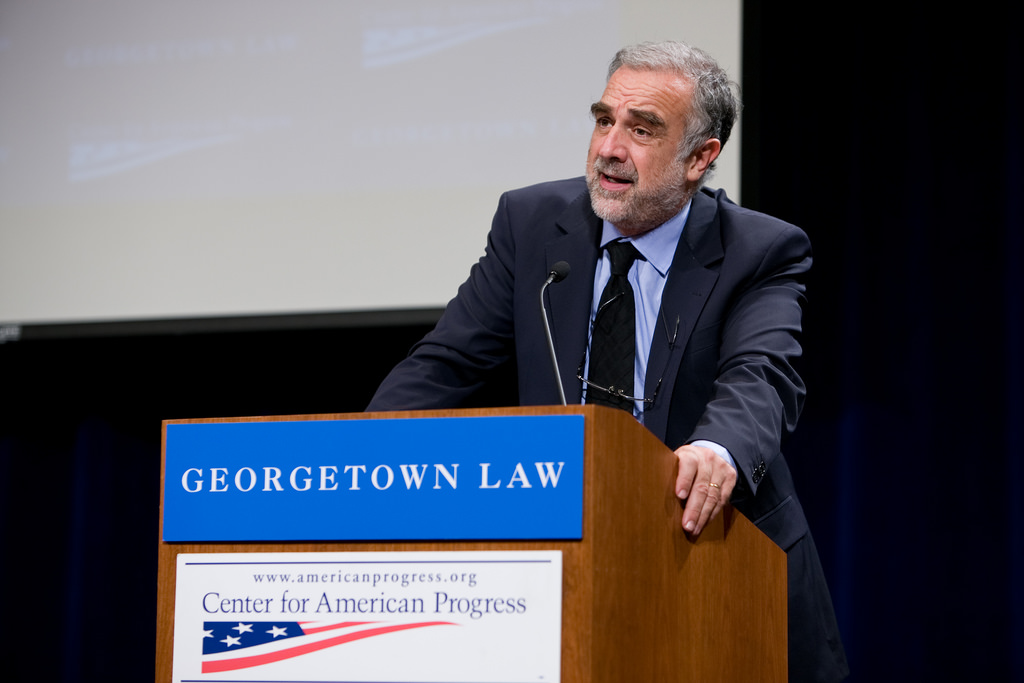This article is a response to Owen Fiss on the prosecution of atrocities in Africa.
I have known Owen Fiss for more than 20 years and admire his commitment to justice. I am delighted to comment on his paper on the recent evolution of international criminal justice. As the prosecutor of the International Criminal Court (ICC), I make daily decisions about how to implement the innovative legal framework established by the Rome Statute, and I appreciate the analysis of these activities by scholars.
I agree with Fiss that pursuing justice for massive crimes is both a moral and a political obligation. It is also a legal obligation. Many states—and in particular the 105 states that are currently state parties to the Rome Statute1—are legally bound to investigate and prosecute genocide, crimes against humanity, and war crimes, as well as to cooperate with the ICC and enforce its decisions.
I also agree that international courts are not a substitute for national courts. Indeed, national courts remain fully responsible for prosecuting the most serious crimes. I learned this lesson personally in 1985, as deputy prosecutor in the Argentine “junta trial” referred to by Fiss. This is also in line with the principle of “complementarity” established as the cornerstone of the Rome Statute. The court intervenes only when the state concerned is unwilling or unable genuinely to investigate and prosecute a case.
Although aspects of Fiss’s article may be challenged2 I will focus on a central theme: the new legal dynamic created by the establishment of the Rome Statute, namely the interaction between national courts and the ICC.
The legitimacy of the Rome Statute and the ICC has solid foundations in an evolution that began at Nuremberg. The decision to establish the Nuremberg tribunal was made by four states after the Second World War; the UNSC created the International Criminal Tribunal for the former Yugoslavia (1993) and the International Criminal Tribunal for Rwanda (1994); and in 1998, 120 states adopted the Rome Statute.
The statute created more than a court; it created a comprehensive global criminal justice system. Substantive law has been codified into one detailed text. Different legal and procedural traditions have been integrated into a new international model. Most significantly—and the subject of strong debate in Rome—was the states’ decision to give the prosecutor power to trigger the jurisdiction of the court independently. By giving the prosecutor propio motu powers to open an investigation, the treaty created a new global legal system. Such a provision, which allows the court to act without an additional trigger the states of the UN Security Council, ensures that the requirements of justice will prevail over any political system. This is a defining feature of the new legal framework.
The drafters were well aware that rendering justice in the context of massive crimes or peace negotiations would present particular difficulties. Careful decisions were made: a high threshold of gravity for the jurisdiction of the court was established; a system of complementarity was designed whereby the court may intervene only as a last resort, when states are unable or unwilling to act; and the UN Security Council was given a role in cases of threats to peace and security.
Fiss ignores this development and suggests that delegating responsibility to international tribunals “qualifies the commitment of the nation-state to human rights and lessens the meaning of the human rights trial that eventually takes place. Half a loaf is better than none, but it is still half a loaf.”
Here I must disagree. The authorization of intervention by an international court indeed reflects a strong commitment to justice. The state parties to the Rome Statute voluntarily committed themselves to preventing and prosecuting genocide; crimes against humanity, and war crimes; they accepted that the court could intervene when they do not fulfill their obligations; and they agreed to cooperate with the court when it decides to act.
By integrating within one network national judicial systems with international institutions and other types of organizations, the design of the Rome Statute offers a new judicial solution for a complex problem. The worst crimes today are committed by actors who receive support from different parts of the world, support that can take the form of weapons and financing. These transnational criminal networks are facing law enforcement agencies that are national. Massive crimes are never simply domestic; they cross borders and affect other states. This was true during the Nazi regime, as well as in the former Yugoslavia. Rwanda’s genocide also had roots and repercussions in the whole region. National states and the international community failed to control these horrific crimes, and that experience shows the need for the national and international commitment embodied in the Rome Statute.
National states have developed legal systems for controlling violence within their boundaries. Legal scholars now face the challenge of exporting the same ideas to the international community. This is the time for legal scholars to incorporate into their understanding of their own national legal systems the emerging international criminal justice system created by the Rome Statute, based on cooperation among states and an independent, permanent international court.
The September 11 attack on New York’s World Trade Center was yet another tragic event demonstrating that, in the real world of the 21st century, a state’s security arrangements will not be sufficient to guarantee the life and freedom of its citizens if the international community is not based on the rule of law.
We must learn our lesson at last: there is no safe haven for life and freedom if we fail to protect the rights of any citizen in any country of the world. In order to protect each citizen, we have to protect every citizen. That is why we must solidify national judiciaries as part of a global system of justice. I welcome Owen Fiss’s analysis of this new era of intersection between national and international justice, and I hope this is just the beginning of a fruitful dialogue.
1. In its preamble, the Rome Statute states that “it is the duty of every State to exercise its criminal jurisdiction over those responsible for international crimes.”
2. The following factual and legal issues should be revisited:
• My office elected to investigate the situation in the Democratic Republic of Congo (DRC) and Uganda, and I invited those governments to refer their cases (see “Three Years Report at www.icc-cpi/int). Referrals, whether by states or the UN Security Council, do not affect in any way the independence and impartiality of ICC investigations. Under the statute, the prosecutor is not bound by the terms of the referrals or obliged to act on their suggestions.
• The Darfur case was referred to the ICC prosecutor by the UN Security Council in March 2005. In February 2007 the evidence was presented by the prosecutor’s office. In April 2007 the court issued arrest warrants against two individuals for 51 counts of crimes against humanity and war crimes. • The arrest warrant against Joseph Kony, leader of the Lord’s Resistance Army (LRA) in Northern Uganda, named 12 counts for crimes against humanity and 21 counts for war crimes, including rape, murder, enslavement, sexual enslavement, forced enlisting of children, and pillaging. Three more commanders are being sought by the court.
• The International Criminal Tribunal for Rwanda convicted 26 senior leaders of the Hutu regime, including the former prime minister and two senior-level government and political leaders, 11 senior military leaders, and two religious leaders. Five people were acquitted.
• The adaptation of gacaca courts to deal with massive atrocities must be further analyzed. It would be wrong to compare gacaca courts with criminal courts. Rather, they might be more appropriately viewed as facilitating public and community plea bargaining. • Charles Taylor was indicted when he was still in power.
• No governments outside of Africa have referred cases to the ICC.
• The investigation of situations (such as those in the DRC or Uganda) and selection of specific cases is based on meeting a gravity threshold established by the Rome Statute. Regional balance is not among the criteria to be considered under the statute. The court need not investigate cases all over the world. The court’s aim is to garner support from all states across the world when it decides to act.
• In Northern Uganda, the LRA, a militia, committed the worst crimes after July 1, 2002. In Darfur, a minister of state and a janjaweed militia leader have been charged with 51 counts of crimes aggainst humanity and war crimes. Their crimes are far more serious than the crimes alleged to have been committed by the rebels. Non-state actors could be criminally responsible under the Rome Statute. Article 27 establishes its equal application to all persons, without distinction based on official capacity.
• The arrest warrants issued by the court had an impact that went beyond apprehending the sought-after individuals. The Ugandan situation offers a good case study of this deterrent effect.








